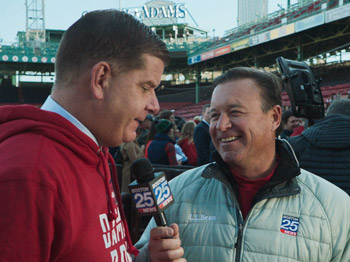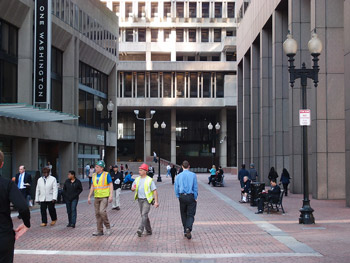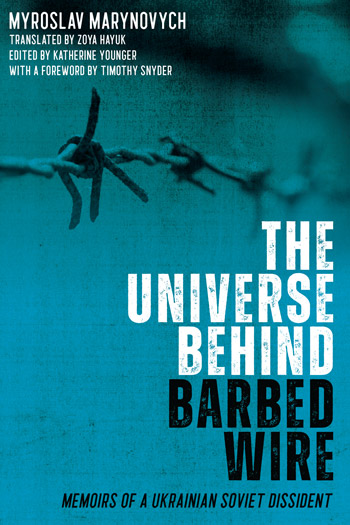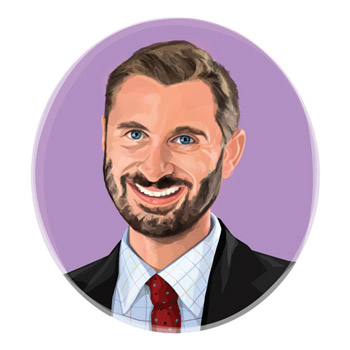Films

Photo by Zipporah Films
City Hall
Directed by Frederick Wiseman
Puritan Films, 2020, 4 hours, 34 minutes
Readers of a certain age may remember Richard Scarry’s Busytown book series for children, which detailed, through Scarry’s whimsical illustrations, all the goings-on of a community. Frederick Wiseman’s City Hall is like a Busytown film for grownups. It documents the behind-the-scenes work that keeps Boston’s city government functioning.
“I made City Hall to illustrate why government is necessary for people to successfully live together,” Wiseman said in a statement to the Venice Film Festival. At more than four hours, the documentary is a testament to all that city government does. Viewers get to drop in on meetings of the school board, the disabilities commission, and the housing authority, as well as police briefings, traffic violation hearings, and a neighborhood group discussing a proposed cannabis dispensary. Wiseman allows viewers to attend a budget meeting, a marriage ceremony, a Veterans Day event, and a parade celebrating the 2018 World Series champion Red Sox – then it’s on to inspect a new building, visit the animal shelter, and listen in on 311 calls.

Photo by Dan DeLucA
Boston Mayor Marty Walsh – now the U.S. Secretary of Labor—appears throughout the film, but it’s not totally Walsh’s show. The camera lingers on the faces of hundreds of people throughout the film, and initially it’s almost bewildering to see ordinary city employees and residents: They are young and old, rumpled and polished, and of many different ethnic backgrounds. Most say nothing. They are not merely background, though – they are the active participants in the work of a modern city, whether attending a meeting, collecting trash, monitoring traffic, or planting seeds. The live-action footage and cityscape montages tell the story without additional narration.
This is Wiseman’s 45th film, and he captures a time just before the tumult of COVID-19 and the myriad issues the pandemic created for everyone, including local governments. If City Hall were filmed today, it might have a different perspective, but its essential theme would remain: Communities – and the people who inhabit them – require services to navigate life’s complexities.
Finally, a note about the pace of the film. It is deliberate and not usually dramatic; some might find it plodding or insufferable at times. But it reflects something profound about its subject: The function of governance is to provide the parameters for community – and that work proceeds meticulously.
City Hall, produced in association with PBS, WGBH, and Independent Television Service, is available on Amazon with MUBI subscription.
What are you watching? Do you have a film to recommend? Drop us a note at editors@intrust.org.
Books

The Universe behind Barbed Wire:Memoirs of a Ukrainian Soviet Dissident
By Myroslav Marynovych
University of Rochester Press, 2021, 483 pp. $39.95 hardcover; $18.99 Kindle
Myroslav Marynovych followed a circuitous path to higher education administration. Now the vice rector for mission at the Ukrainian Catholic University in Lviv, he also has been an editor, an author, a human rights activist, and a political prisoner who spent seven years in a Soviet prison camp, followed by five years of internal exile in Kazakhstan.
This is his memoir – a story of bravery, of remembrance of friends and colleagues who also resisted Soviet power, of the mistreatment and brutality suffered by those in the Gulag, and of his own spiritual growth during his incarceration.
Marynovych was first questioned by the KGB in 1973 after he placed flowers at the monument to 19th century Ukrainian poet Taras Shevchenko. In 1977 he was arrested for daring to sing a Ukrainian song at a concert. In 1978 he was sent to Perm-36, a forced labor camp known as the harshest political camp in the country.
Early on he writes, “Many readers might ask, ‘OK, so what about all those anti-Soviet activities for which you were fired from your jobs, summoned to the KGB, and accused of public disturbances?’ It is difficult to explain what exactly these activities consisted of: our public expressions of Ukrainianness, demonstrative solidarity with the political prisoners, refusals to denounce those who fell under KGB suspicion, preservation of our national and religious traditions, and a refusal to succumb to fear…. Our major ‘transgression’ was attempting to live a normal Ukrainian life. The Soviet system saw this as a challenge worthy of punishment.”
This is a fascinating story of the courageous life of a political dissident in the last decades of the Soviet regime, told with scrupulous attention to detail and awareness that his conscience and convictions, experiences and faith have contributed to an extraordinary life.

Illustration by Ellen Marello
Verbatim
The church can be of service to athletes [by] helping to remind them about what’s true. The temptation to over-identify with your vocation is strong, [and] as an athlete it’s even stronger…. How might Simone Biles have felt in that moment when she decided not to compete? As a church we can remind athletes that even in their loss and dis-identity, God is present – not just in the glory and the honor and the spectacle … but also in the loss and the pain and the loneliness. For the church to be able to tell people that you are loved, you are cared for, and you are valued independently of what you do or accomplish is enormous.
— Brian Gamel, Ph.D.,#is a Postdoctoral Research Fellow at the Faith & Sports Institute at the George W. Truett Theological Seminary, Baylor University. Excerpted from the Quick to Listen podcast.